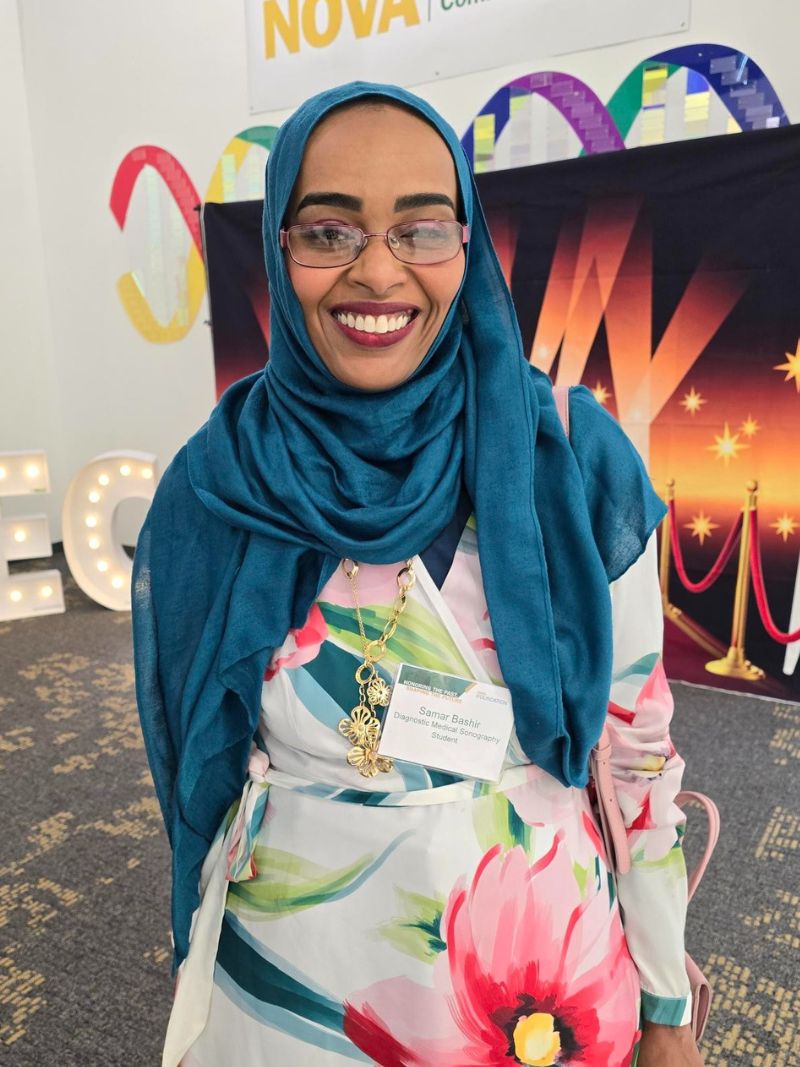A life-altering event pushed Samar Bashir onto a vastly different pathway. Eventually, she boldly decided to give up job security for a new opportunity as a STAR (Skilled Through Alternative Routes). Now, as she nears graduation from NOVA’s sonography program, she is set to fulfill her deep passion for helping others.
Samar Bashir is #OneofMillions of STARs.

#TearThePaperCeiling @OpportunityatWork
Read Her Journey below:
Samar Bashir had always dreamed of becoming a doctor, but that dream ended in 2013 when her father, who was young, died unexpectedly. Almost overnight, Samar’s life changed drastically; instead of going to medical school, she found herself in the workforce, shouldering the responsibility of supporting her mother and younger siblings.
Sudden cardiac arrest claimed not only Samar’s father but also the lives of her two younger siblings. Such devastating losses convinced Samar to pursue a healthcare-related career after all, even if that meant giving up on medical school. Today, she’s enrolled in NOVA’s sonography program at the MEC.
Samar’s drive to help others stems from hoping she can spare other families from the tremendous losses she has endured. She’s passionate about raising awareness of the role heart health plays in all our lives — not just the elderly but younger, seemingly healthy adults and children. It’s personal, too; for Samar, her profession is a way to honor the legacy of those she’s lost.
Tell us a little bit about yourself and your background.
I’m originally from Sudan, where I spent two years in medical school. When I came to the United States in 2003, I had to start over with my education.
I began at NOVA with English as a Second Language (ESL) classes, then I earned my associate degree in biology in 2006. After transferring to George Mason University, I earned my Bachelor of Science in biology and my master’s degree in public and global health.
What brought you to NOVA?
I’d always wanted to be a medical professional. Initially I wanted to become a doctor, but the trajectory of my life changed drastically when I lost three family members to sudden cardiac arrest. First my father died, then my two younger siblings. It was just shock after shock — after shock. They were healthy and … just, boom. My siblings were sleeping and had no medical issues, no complaints, nothing.
When my brother passed away, I realized how important it was to get my own heart checked — and for my siblings to do the same. My doctor referred me for an echocardiogram to make sure my heart was functioning properly. I fell in love with echocardiography as I was having the procedure done. I even asked the echo technician how I could get into the field! She told me that NOVA had a good program and that I should research it online. So I did!
How did you feel about being accepted into the sonography program?
Being accepted meant two things to me: (1) fulfilling my dream of working in cardiology and (2) raising awareness about cardiovascular disease among younger generations. It’s so important for everyone to prioritize regular checkups to make sure their hearts are functioning well. I'm very grateful that NOVA’s program is so strong and has such a solid reputation.
Where do you see yourself after NOVA?
For 10 years, I worked as an academic advisor at the Saudi Arabian Cultural Mission here in the U.S., where I helped Saudi students apply to medical school. I also followed up with my advisees to make sure they were keeping their grades up, and the mission would help the students identify a subspecialty.
Those medical students were pursuing their dreams, then calling and thanking me for helping them graduate. So here I was, helping all these people but not helping myself. I was working, but I didn’t really see myself going anywhere. I felt stuck at my job, so I decided to make a change.
At first people couldn’t believe I quit my job to return to NOVA; they thought it was a step down. What they didn’t realize is that I won’t have to look for a job when I graduate — I pretty much have a job already lined up, with a salary that’s higher than my previous position!
I graduate from the program in December; then I have to sit for my exam with the echocardiography registry board. It’s a national exam. Once I pass, I can become a registered sonographer and work anywhere in the U.S.!